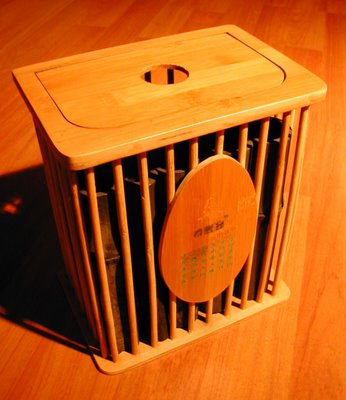Chinese Superstition

China has a millennia-old tradition of superstition (astrology, numerology, fengshui geomancy, qigong practicioners boasting supernatural gifts) and non-evidence-based medicine. Within a tradition of such medicine, there is a mechanism that weeds out treatments with any strong effect: damaging ones disappear because they lead to lawsuits against druggists and physicians; significantly beneficial ones disappear because they undergo clinical testing and become co-opted by scientific medicine. Chinese medical researchers, meanwhile, are doing well in their international scientific field and not paying much attention to the roots, fungi and snake blood of the trad quacks.
Traditional drugstores are still very much a part of Chinese culture, often referring in their architecture and packaging to a curious blend of the aeons-old tried-and-true and the cutting-edge scientific. I visited one in Hangzhou the other day that looked like a 19th century merchant's residence. The message of Chinese alternative medicine to customers is that it is venerable, brand new, semi-magical, clinical, natural and high-tech. In fact, it won't hurt you and it won't heal you.
Numerology in its simplest form (based on the similarities of words) states that eight is good and four is bad. Everybody wants a phone number with 88 in it, and nobody is allowed to begin at a new job on the 4th, 14th or 24th -- neither in the Gregorian nor the Chinese Farmer's calendar. At least they don't have a problem with 13.
The old religions are once again encouraged in China, and many temple compounds currently look like construction sites thanks to the munificence of noveaux-riches entrepreneurs freed from the shackles of state socialism. Effigies of Mao Zedong receive considerable religious attention along with Amithaba, Guanyin, Laozi, Confucius and the others. Chinese Buddhism is such a mess -- simple stupid idolatry, the original intellectual content irrecognisable.
One internationally known new religious movement, Falun gong, is not liked at all by the authorities. FG's version of things is that they are a peaceful meditative movement being persecuted by a nasty totalitarian regime. In my view it's actually a case of a nasty manipulative millennarian cult being persecuted by a nasty totalitarian regime. FG's leader is one of the aforementioned qigong practicioners boasting supernatural gifts.
The latest piece of Chinese superstition I've come across is another combination of the rootsy and the pseudo-scientific. Stores offer little wooden cages neatly packed with short charred-black bamboo sticks. They're supposed to work as air-fresheners -- because of active carbon! If you ground several hundred sticks really finely, packed a filter with the powder and put it into an industrial-strength fan, then I guess it would actually work to free the air in a room of aerosols. But the little cages are at least an intriguing conversation piece until the next supernatural fad appears.
[More blog entries about skepticism, superstition, China; skepticism, vidskepelse, Kina.]Labels: China, skepticism, superstition



4 Comments:
I visited a Buddhist temple in China today and was extremely disappointed. People here go through the motions and aren't really sure what anything means, or even if Buddha is god or not. It seems like half of what happens in a Chinese temple involves wishing for more money, which in itself shows an obvious misunderstanding of Buddhism.
My impression is that most Chinese care only about money, food and their families. Any religion is worthwhile only to the extent that it helps them make more money and get better food, and otherwise benefits their families.
Of course! The Chinese, above everything else, are practical people. And most definitely not into dogma...Coming from Canada, I find this sort of refreshing.
It's only natural why do you all have a problem wiht it. Chinese culture is just a form of their religion. yea and drew, martin you people know nothing about religion. Andrea is the only on ewho actually makes sense. Now let the Chinese be,
Post a Comment
<< Home